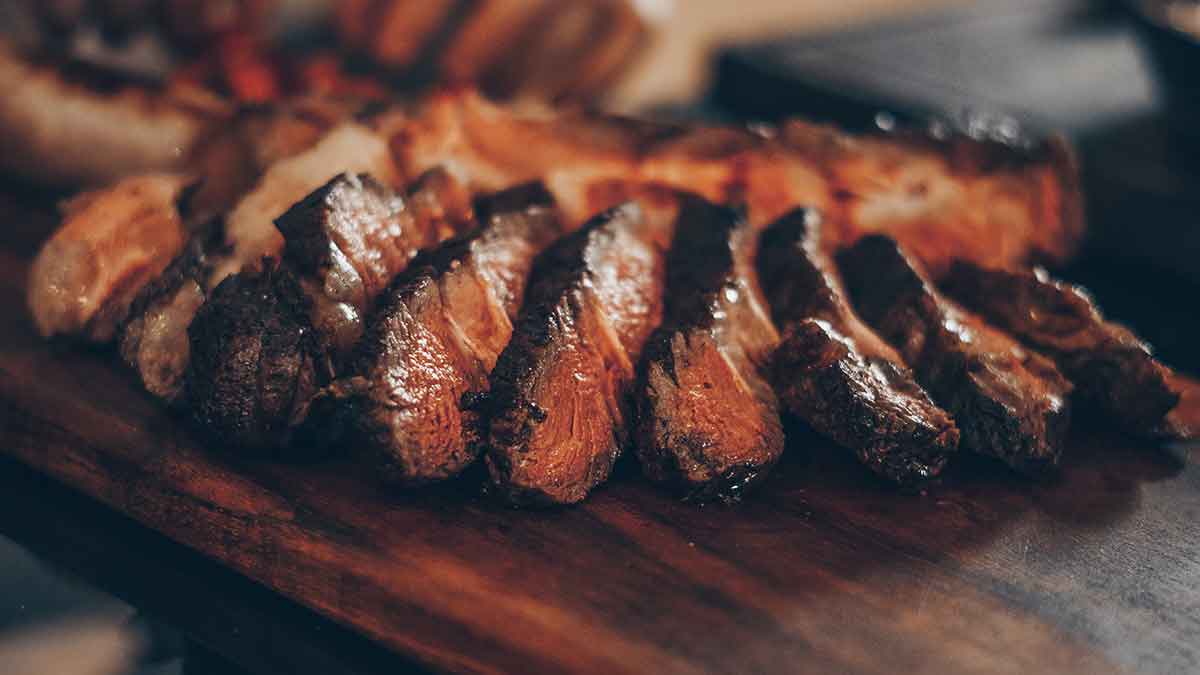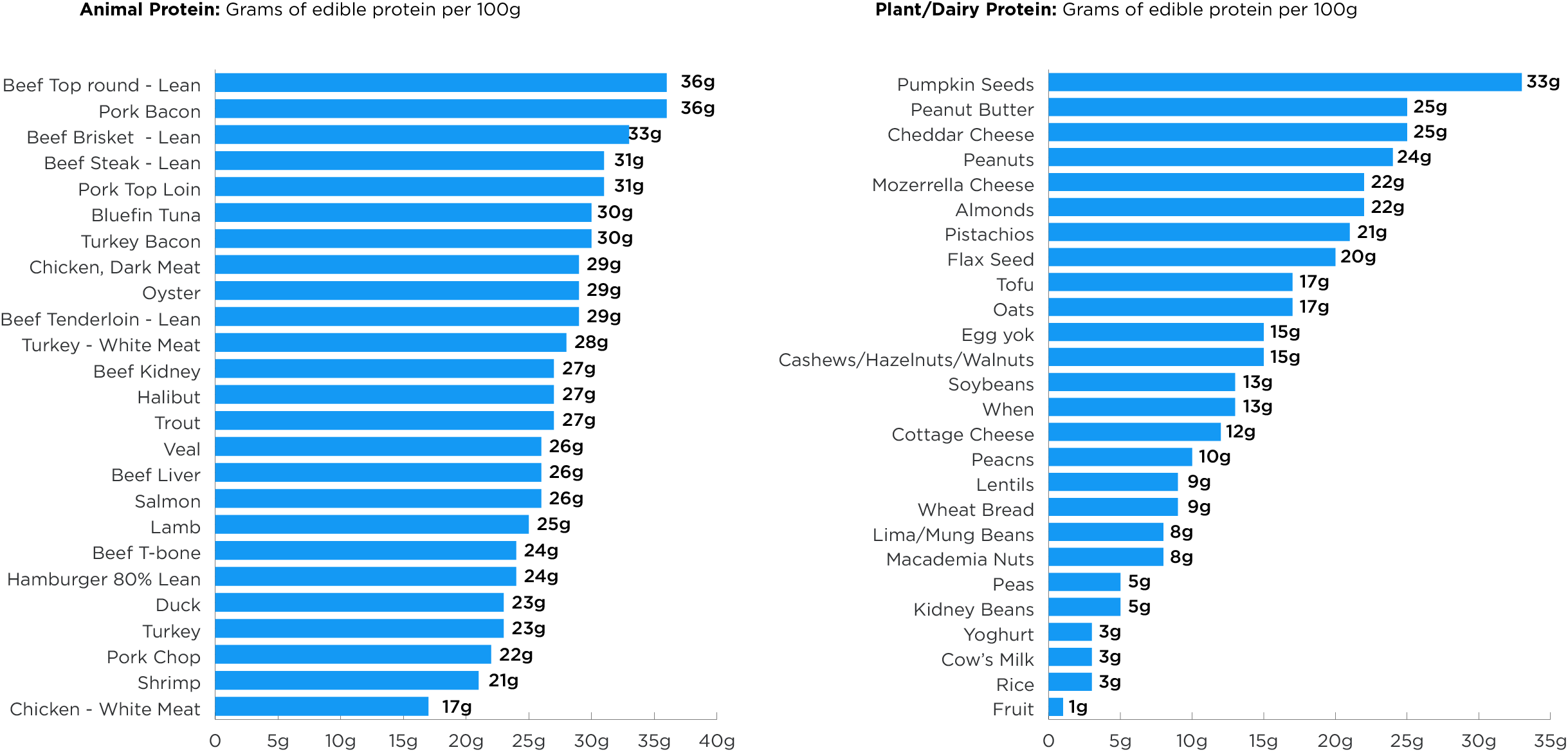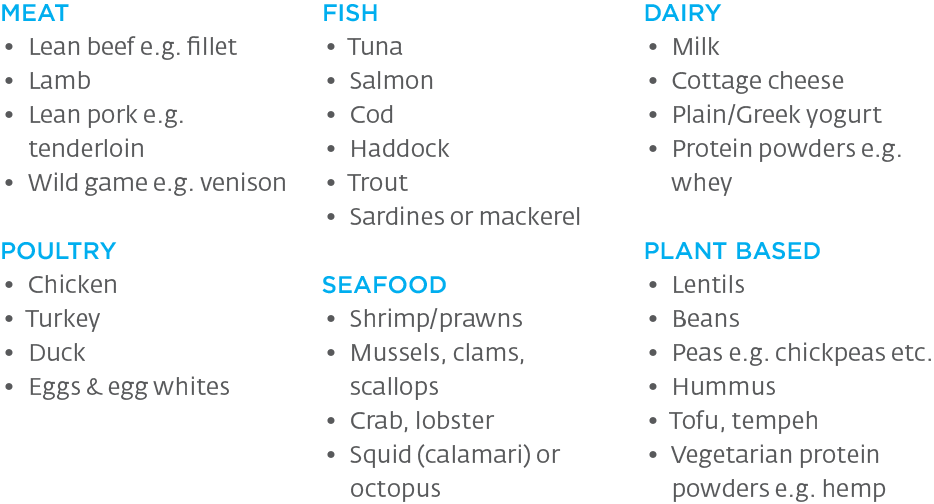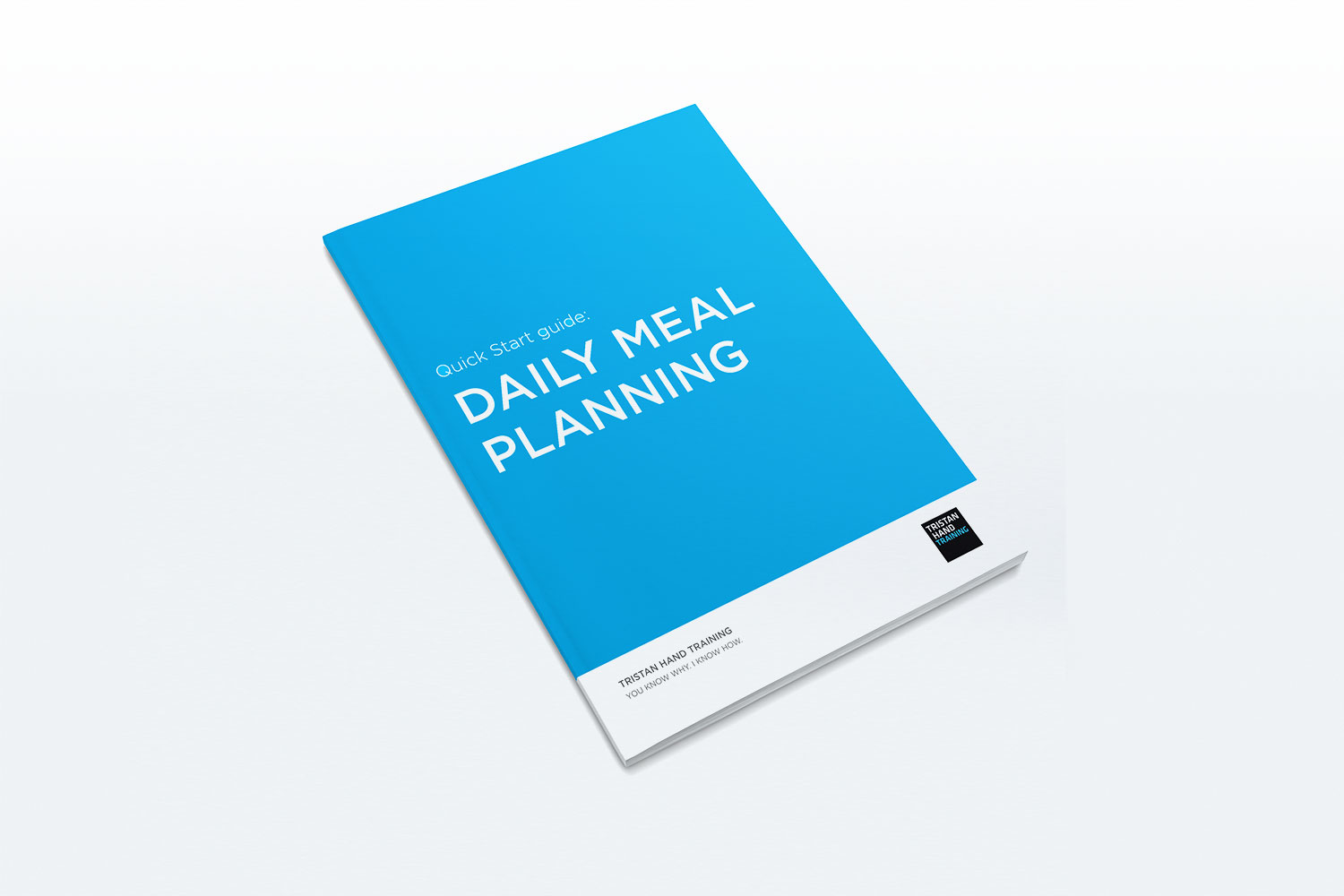First off, what is protein?
Protein is the most abundant component of the human body besides water.
Protein is used by the body for growth and repair, as well as for strengthening the bones, which is why it’s so vital while training. An effective exercise regime, such as weight training, actually damages muscle tissue – it is the body’s natural repair process that builds and strengthens muscle so it’s better than before. Protein is vital to this process. Protein also helps to build tissue and cells, and provides building blocks for hormones, enzymes and antibodies.
Protein is found in meat, dairy products, nuts, seeds, soy, beans and grains. Eating adequate amounts of this essential nutrient contributes to satiety (feeling full) and weight control. Choosing low fat protein options as part of a balanced food program will give you the most benefit while watching calories.
If you’d like more info on exactly what to eat in a day to hit your nutrition goals, download our Free Daily Meal Planning Guide here:
Download our Free Daily Meal Planning Guide
Regulating Blood Sugar
Eating a protein source at every meal will help you avoid spikes in blood sugar. A balanced meal combines complex carbohydrates – such as whole grains and vegetables – with lean protein. Eating balanced meals that contain a protein source helps weight control – the energy in protein is released slowly, meaning that you don’t get the kind of immediate energy spike you get from processed carbohydrates, like chocolate or white bread. These spikes in blood sugar promote fat storage, so are best avoided. Protein is the most efficient nutrient for switching off hunger signals.
 Eggs are a great source of protein, but the yolks are high in saturated fats. Therefore try to avoid having more than two egg yolks per meal. You can eat as much egg white as you like.
Eggs are a great source of protein, but the yolks are high in saturated fats. Therefore try to avoid having more than two egg yolks per meal. You can eat as much egg white as you like.How much protein should you eat in a day?
Please note these amounts are specific to repairing the muscle damage caused by training and exercising.
Sedentary adult: just to maintain regular body function adults need a daily requirement of 0.8g of protein per kilo of bodyweight.
So if you weigh 80 kg, and don’t have a very active lifestyle, you would need 64 grams of protein each day.
Endurance: A moderately active adult who exercises once or twice a week would need 1.2g – 1.4g of protein per kilo of bodyweight.
That means that a moderately active person of 80kg would need around 100 grams of protein per day.
Strength and power: A regularly active adult who exercises twice or more a week needs 1.4g – 1.8g of protein per kilo of bodyweight.
Using the same example, a person of 80kg would need 112 – 144 grams of protein every day.
Athlete in competition: An athlete competing in athletics, rugby etc who trains four to six times a week would need 1.8g – 2.4g of protein per kilo of bodyweight.
At 80kg, an athlete would need 144 – 192 grams of protein per day.
You can see that the basic premise is the harder you are working your body, the more protein you require every day.
Here’s how to work it out for yourself:
Check out the table below to help you calculate how much protein you require in a day. This is based on requirements for an adult exercising once or twice a week, looking to build lean muscle mass and keep body functions, organs and structure healthy.
-
Bodyweight 55kg = 66g – 77g of protein per day
-
Bodyweight 60kg = 72g – 84g of protein per day
-
Bodyweight 65kg = 78g – 91g of protein per day
-
Bodyweight 70kg = 84g – 98g of protein per day
-
Bodyweight 75kg = 90g – 102g of protein per day
-
Bodyweight 80kg = 96g – 112g of protein per day
-
Bodyweight 85kg = 102g – 119g of protein per day
-
Bodyweight 90kg = 108g – 126g of protein per day
-
Bodyweight 95kg = 114g – 133g of protein per day
-
Bodyweight 100kg = 120g-140g of protein per day
How much is too much?
A high protein intake alone will not result in an increase in strength or growth in muscle. This can only be achieved when combined with appropriate resistance training. Excess protein consumed is usually stored as fat, while the surplus of amino acids is excreted. This can lead to weight gain over time, especially if you consume too many calories from protein sources that are also high in fat, such as pork, butter etc. More on this below.
How much protein can I get from my meals?
 Let’s keep it simple and say you have a requirement of 90 grams of protein in a day. You want to get approximately 30grams of protein per meal.
Let’s keep it simple and say you have a requirement of 90 grams of protein in a day. You want to get approximately 30grams of protein per meal.Here are some ideas to help you get 30g of protein in a meal.
- Two single serve cups of Greek yogurt will get you to that 30grams of protein real fast. Avoid flavoured varieties which are often high in sugar. Rather add in your own berries for a flavourful antioxidant boost.
- 12oz/360g of Greek yogurt with berries = 36 grams of protein.
- Cottage cheese: Whether you’re looking for a light and filling meal or a snack to hold you over until dinner, cottage cheese works wonders. It’s high in protein and low in calories – just be sure to watch the sodium content. You can add a small scoop of chia seeds for some healthy fats and fibre to promote feeling full.
- 1 cup of cottage cheese (28 grams of protein) with 5 chunks of pineapple and 1 tablespoon of chia seeds = 29 grams of protein.
- Grab a bagel. Yes you read that correctly! Some varieties like multigrain actually contain a decent amount of protein. Just read the pack beforehand. Add a small helping of cream cheese and some salmon (which is filled with healthy fats) and you’ve got a delicious, protein rich breakfast which will assist in muscle growth and recovery from your workouts.
- Multigrain bagel (10g of protein) + 2 tsp cream cheese (3g of protein) and 3oz of smoked salmon (16g of protein) = 29 grams of protein.
- Protein smoothies.
Depending on how you mix it. smoothies can be either be a massive sugar and calorie bomb or an incredibly nutrient-dense hit to your system. In the recipe below, protein powder and almond butter up the protein count significantly, while the unsweetened almond milk provides a low sugar, low calorie base.= - Smoothie made with: 1 scoop of protein powder (20g of protein), 1/2 cup of strawberries, 1 cup of unsweetened vanilla almond milk (1g of protein) and 2 tablespoons of almond butter (7g of protein) = 28g of protein.
- Eggs have 6 grams of protein, but have 1.6g of saturated fat per egg – all in the yoke. If you eat a lot of eggs, stick to 2 yokes per serving – meaning if you were to scramble four eggs, you would discard two of the yokes. You can eat unlimited egg whites.
- 4 eggs is approx 25g of protein.
Please remember to drink 2-3 litres of water each day. That will also help you feel full and aid in protein digestion.
Here’s a graph to show you the nutritional protein value of meats and non meat protein sources.
Sources of protein – Animal, Plant and Dairy – grams of edible Protein per 100

Caution! Not all proteins are equal!
Please note that just because a food is high in protein, doesn’t make it automatically healthy in every way. Some high protein foods, such as bacon and egg yolk, also contain a lot of saturated fat and calories. You can find more detail on this in our Free Daily Meal Planner, but as a rule of thumb, opt for lean sources of protein most of the time.
Sources of Lean Protein

Grab your copy of the Free Guide here:
Download your free daily meal planner
We want to offer you as much information as we can, we’ve studied, tried and tested all this information for you. All you need to do now is apply it to your meals and your goal to a healthier life can be one step closer to you.
If you have any questions on any of the above, feel free to get in touch – we’re always happy to answer questions.
The TH Training Team





